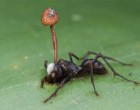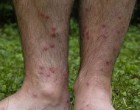Zombie ants have been manipulated by secretions from a killer fungus

The world of parasites that manipulate the behaviours of their host became even more fascinating this September. A paper published by Charissa de Bekker and… Read more »

The world of parasites that manipulate the behaviours of their host became even more fascinating this September. A paper published by Charissa de Bekker and… Read more »

The Bill and Melinda Gates Foundation has just celebrated the tenth anniversary of its Grand Challenges in Global Health Programme. One of the original projects… Read more »

We are delighted to announce our first birthday. BugBitten was launched exactly a year ago today as a blog for the parasitology and vector-borne disease… Read more »

Worms that burrow into your skin are the stuff that nightmares are made of, yet approximately one billion people across the globe are infected with parasitic… Read more »

For those in the northern hemisphere, summer holidays are upon us and with them comes the pleasure of taking part in fresh water sports. But beware, minuscule… Read more »

Mosquitoes that transmit malaria are attracted to individuals by the profile of their body odour. Differences in odour profile make some people more attractive… Read more »

One in 6 people worldwide are exposed to infection by a large group of parasitic or bacterial infections that disable, disfigure and debilitate, killing 500,000… Read more »

The beautiful and rare Alcon Blue butterfly, Maculina alcon, has a surprising life cycle; for about nine months of the year it behaves like a cuckoo. It belongs… Read more »

The use of livestock as bait to attract mosquitoes away from biting humans, and thus reduce malaria transmission, is an attractive proposition that has been… Read more »

Emerging infectious diseases in honey bees have now been shown to spillover into bumblebee populations and may contribute to the worrying global decline in… Read more »